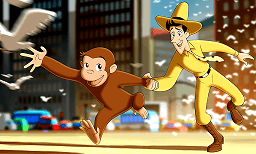Curious as a Monkey
Oh, what's that? What is that? Ohh, that thing has numbers on it! Hey, look at that thing. No, that other thing.—The Curiosity Core, Portal
A character, usually a child, who is always monkeying with things to see how they fit together, or work, or what they are made of. (Always in total innocence.) Generally found with assorted parts of a now-out-of-commission machine scattered about his feet. Or attempting to find out what the Big Red Button does. Truth in Television for anyone who's seen the aftermath of a bored six-year-old with any form of tool.
Curiosity Is a Crapshoot even for him, but generally turns out well. Usually the Cheerful Child.
The Wrench Wench can show signs of this in the presence of an engine although she usually does less damage. (She may even improve it.)
Compare with the Constantly Curious, who ask questions for the same reason. Curious as a Monkey tends to be a less persistent nuisance, but makes trouble on a much grander scale. Sometimes, they overlap, when the child has moments of acting like either.
Contrast Little Jimmy, who has no characterization except his ignorance.
Anime and Manga
Comic Books
- Dennis the Menace
- This is the defining trait of Beastbox in Transformers, who lacks a proper robot mode and instead has a gorilla as his primary form. He's naturally curious, like an ape... but he's also easily angered and frustrated. This doesn't help him in his job as an interrogator; there isn't an Autobot who has made it out of a session with Beastbox alive.
- Calvin in several Calvin and Hobbes strips. He throws water on his dad to test dad's reflexes, drops an expensive compass out of a tree to study gravity and considers wetting his pants while wearing winter clothes just so he can know how astronauts feel when they go in their suits.
Literature
- The trope-naming monkey himself, Curious George.
- Lois McMaster Bujold's Miles Vorkosigan as a child. Cordelia complains at one point that she didn't even know that a certain machine could come apart.
- The protagonist of "The Caves and the Cockatrice" by E. Nesbit:
His inquiring mind led him to take clocks to pieces to see what made them go, to take locks off doors to see what made them stick. It was Edmund who cut open the India rubber ball to see what made it bounce, and he never did see, any more than you did when you tried the same experiment.
- In Please Don't Eat the Daisies by Jean Kerr, this is the defining trait of one of the children a toddler who could "take apart the toaster with a wooden spoon and a drying pan".
- Skysong (Kitten), a young dragon, from Tamora Pierce's The Immortals series can be this. While on one hand Skysong stayed at a political discussion over exploring a capital city (apparently very interested); Skysong has also been known to open locks to see what is behind them, and was describes as "like a bear in your wardrobe, except a bear doesn't have magic to open locks" if her curiosity is not satisfied.
Music
- Monkey See, Monkey Do, a song by Eddie Turner, an American bluesrock guitarist.
Tabletop Games
- The kender in Dragonlance.
- The Curious disadvantage in GURPS. It overlaps with Constantly Curious, but the presence of this trope—the description explicitly says that a character with the disadvantage will be the one who presses buttons to find out what they do—is the main reason why it's a disadvantage.
Video Games
- The 19-year-old magician Owyn from Betrayal at Krondor, with anything concerning magic.
- GLaDOS' Curiosity Core, a One-Scene Wonder from Portal, provides the page quote.
Web Comics
- Gadgeteer Genius Molly in The Inexplicable Adventures of Bob pesters people to let her examine any machines they happen to be using. She seems to have a particular fascination with the workings of firearms, even when they're being pointed at her.
- In Nip and Tuck, Hortense's niece
- In Impure Blood, Mac, the Wrench Wench acts like this around any new machinery. [dead link]
- In Wooden Rose, Lillian deduces that the strange child is this, and not evil.
- Dissonance: Pandora.
Western Animation
- Dee Dee from Dexter's Laboratory. "OOOOOH! What does this button do?" (Trope namer)
- Although Dee Dee's behavior occasionally blurs the line as to whether she's genuinely curious about the workings of her brother's varied and sundry inventions, or if she's just using it as a blind to obfuscate the fact that she knows exactly how much damage she's doing, and takes malicious glee in doing so.
Real Life
- Monkeys. Never, ever leave one unattended in your house.
- One of the defining behaviors in 'determining' autism in children is the tendency or recurrent desire to take things, mostly machines, apart, often to see how they work. (Autism, like everything else presently in the DSM, is over-diagnosed. Curiosity is not in and of itself a symptom of autism.)
- Many species of parrots and macaws, but Kea Parrots are kings of this trope. Known as "Clowns of the Mountains", their ability to solve puzzles and group cooperation, vital when living in a harsh environment, makes them a pest for residents as their curiosity often causes them to take apart cars with their sharp beaks or fly away with someone's passport.
